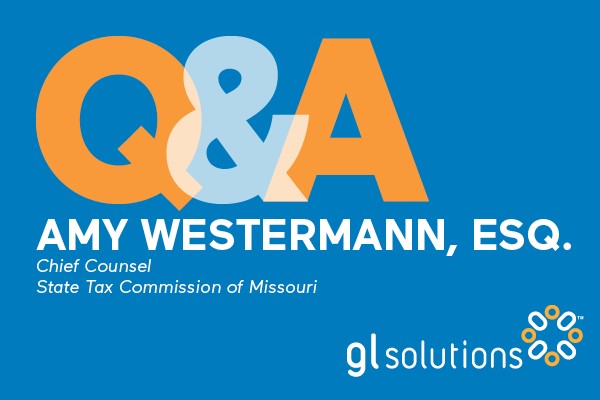GL Solutions interviewed Amy Westermann Chief Counsel for the State Tax Commission of Missouri for our series on how to eliminate paper at your licensing agency. Discover the challenges they encountered, as well as the resulting long-term benefits.
Q. Working in a state agency, particularly a state tax agency, involves a bit of paperwork. How was the department workload prior to going paperless?
A. Prior to our section of the agency going paperless, we housed tens of thousands of hard files in filing cabinets within our workspace. Once a case was closed and the hard file no longer needed, team members would be required to log the hard file in an archiving system, create additional paper documents to catalog the hard files, place the hard files in cardboard boxes, and have the boxes moved to an offsite archiving center for a 10-year retention period. Even with a numbering and alphabetizing method for cataloging files, our team had difficulty physically maintaining the files due to the volume of paper stuffed into a limited space. Because we work with legal documents such as pleadings, motions, and exhibits, printing the documents often required reams of paper, which also then had to be filed in the limited space available. Our team specifically has always worked remotely as well as in our headquarters, and travel is a necessity. Prior to going paperless, we would travel with physical files in boxes, on carts, and in briefcases. Invariably, documents would be placed in the wrong files or would simply vanish and never make it into the files. Utilizing, maintaining, and storing paper files required office space, personnel time, and money, all of which could have been put to more efficient uses.
Q. COVID changed the way agencies do business. How has the commission changed the way in which they do business?
A. Although our team has always worked remotely some or all of the time, COVID forced us to reevaluate the manner in which we work with the data necessary to manage our caseloads. An old adage in legal practice is “touch the file once.” Rather than keeping physical paper files in a centralized location where a team member would need to locate data and then copy or scan it for his/her own use and then refile the data, we decentralized access so that team members can access the data virtually from anywhere and keep the data in digital form. For example, I designed and implemented an e-files system on our server so that each case has its own virtual file utilizing a universal numbering and naming convention that matches how we store the data in our GL Solutions case management system “backend.” Our team members can access the e-files using a virtual private network (VPN) connection and view and download any document stored in the e-files. Prior to COVID, taxpayers, attorneys, and officials outside of our agency were required to supply their documents and data to us on paper via mail, which then meant a team member had to either manually enter data into our GL Solutions case management system and had to make paper copies for sharing with our team and with the opposing party to the litigation. Now we utilize file transfer protocol (FTP) accounts for those outside our agency so that they can quickly and easily upload digital documents for use by our team and for storing in the corresponding e-files.
Q. Going paperless can seem like an overwhelming process to some. With staff shortages and the thought of changes in departmental process, what advice would you give agencies looking to make this change?
A. The advice I would give to agencies looking to make this change is have a comprehensive or high-altitude vision of what you want your paperless system to do and how it should function. Study and reach out to other similar agencies that have made the change to paperless systems. Consider the hurdles and pitfalls they faced, which might be the same hurdles and pitfalls you will face and ask how they were overcome. I have converted two agencies to paperless systems in the last few years. In my opinion, the toughest task is changing hearts and minds where work groups have never truly moved away from using paper as either a primary system or as a back-up system for managing data. One agency in particular actually printed and stored all of the documents that the agency was utilizing in digital form due to fears that the computer systems might fail and the agency would lose its data. If steps are taken to ensure that regular data backups are occurring and that data is stored off-site in a safe (perhaps encrypted) manner, there is no need for a paper back-up system.
Q. What hurdles did you see in implementing this change in your system to go paperless and how did you overcome them?
A. As I mentioned in the previous answer, changing hearts and minds was the highest hurdle to overcome in convincing the team that the total switch from paper to digital and e-files was long overdue. One method I used to make this change was to announce a date certain when all new files would be in digital form and all files prior to that date certain would remain in paper form. Creating this “deadline,” which was tied to the start date of our appeal cycle, along with some basic training and instruction as to how the new digital documents and e-files would be maintained, helped build positive anticipation. This deadline also assisted us in knowing that every file we worked after the date passed would be easily and readily accessible by our entire team. In my opinion, this concept is important to team building in that all team members are trusted and capable of utilizing the data housed in any of the e-files and are expected to follow the rules for using e-files, such as keeping up with universal naming conventions anytime they save a document to an e-file.
Learn more
GL Solutions helps governments run, grow and adapt. To learn more, explore our website, call us at (971) 337-2659 or email us at hello@glsolutions.com.


